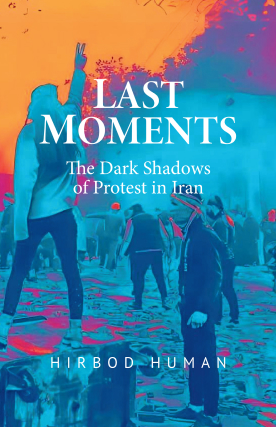


Vital, Heartbreaking Stories of Iranian Citizens Facing Tyranny.
This compact, outraged collection captures, with urgent precision, moments of hope and despair, connection and confusion, in the face of oppressive tyranny in Iran. Living lives weighted with dread, Human’s everyday Iranians encounter authoritarian violence—in traffic, in homes, in a hospital—that they sometimes anticipate in the moment and sometimes do not. On occasion, they glimpse the possibility of change, like the protagonist of “Car,” who contrasted the chaotic honking around him—“It wasn’t clear if the city was celebrating or if it was enraged”—to earlier moments of citizen uprising, noting his queasily mixed emotional response: “In one second you would feel scared of being on the streets, and in the next second, you would feel brave.” Like all these stories, “Car” briskly builds to an abrupt ending, making clear the zeal with which those with power will crush even the barest possibility of change or protest.
Again and again, Human’s people find that there’s little an individual can do when up against authorities who are eager to kill to maintain their power. The stories are all
Comparable Titles: Goli Taraghi, Siamak Vossoughi
Production grades
Cover: A
Design and typography: A
Illustrations: N/A
Editing: B
Marketing copy:A
Last Moments
The Dark Shadow of Protests in Iran
$18
Synopsis
Airport
In a cramped, oppressive room, a young woman faces the terror of an uncertain fate at the hands of the Iranian Revolutionary Guard. Her demeaning encounter with a cruel captain showcases the pervasive fear and powerlessness experienced by many under the regime.
Prison
The reader follows an unnamed protagonist, numbed and broken from his incarceration, as he experiences the morning before his execution. With shades of Arthur Koestler’s Darkness at Noon, as he contemplates his life and imminent death, the brutal reality of state violence and the psychological torment inflicted upon political prisoners in Iran are starkly revealed. His perceptions blur; he has little to no feeling left. As the other prisoners are summarily shot by the firing squad, the reader experiences in a visceral way the brutality of the regime.
Family
Rojan, a heavily pregnant woman with two small children, frantically prepares to search for her detained husband, Atta. Despite assurances from her family, she feels an impending doom. Her struggle represents the anguish of countless families torn apart by unjust imprisonment and executions, underscoring the relentless anxiety and fear that pervade their lives.
Car
A routine car ride through a city in turmoil turns into a nightmare for Hamed. Whilst relating what he sees to his family via videocall, the tension escalates as he becomes aware, vaguely, that while all is chaos outside the car something is also very wrong inside it. This story captures the vulnerability and unpredictability of life in Iran, where any brief second can become a fight for survival.
Home
Forming a follow-on story to the story ‘Car’, the reader follows the reaction of Hamed’s family as they realize something has gone horribly awry, shattering their sense of security. The story highlights the fragility of every family in a country where one can be caught in the cycle of violence without even taking part in protest.
Hospital
Amidst the sterile environment of a hospital, a wounded protester clings to life. The hospital, typically a place of healing, becomes another arena for fear as the medical-staff protagonists – a brave doctor and nurse – navigate the risks of treating individuals targeted by the regime. This narrative underscores the pervasive impact of political oppression, even in places meant for care and recovery. Each story in Last Moments is written with in direct, though still poetic language, with a cumulative effect that, although harrowing, maintains a hopeful message and will stay with the reader long after they’ve finished reading.

Add comment